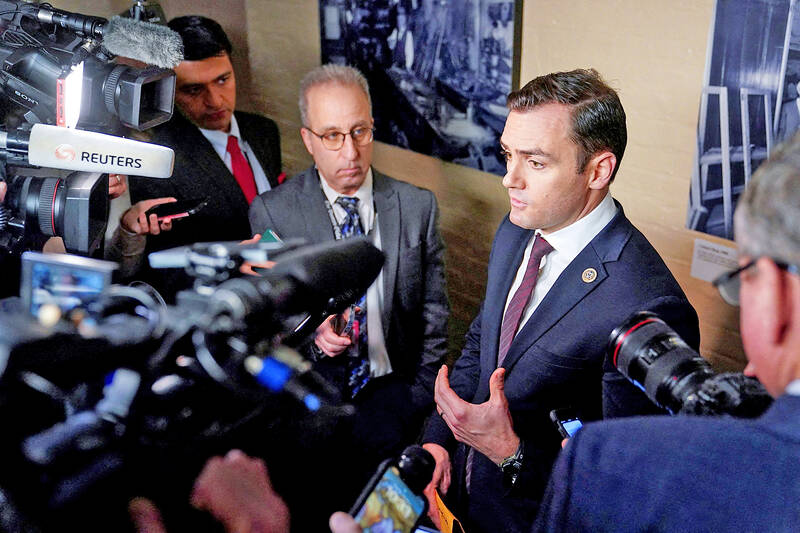A US congressional committee on Thursday questioned the US Navy over what it called “alarming delays” in weapons deliveries to Taiwan, asking why production sometimes languished for months or years after purchasing deals were signed.
Time was running out to deter military action by China toward Taiwan, US Representative Mike Gallagher, chair of the House of Representatives’ Select Committee on the Chinese Communist Party, and US Representative Young Kim, chair of the House Foreign Affairs Subcommittee on the Indo Pacific, said in the letter to US Secretary of the Navy Carlos Del Toro.
With more than 340 warships, China possesses the largest naval fleet in the world, and deterring a Chinese invasion of Taiwan “will require turning the island into a porcupine, stockpiled with an arsenal of weapons that can target the Chinese fleet and prevent the PLA [People’s Liberation Army] from establishing a lodgment in Taiwan,” the letter said.

Photo: Reuters
“At this hour of danger, however, when the United States should be arming Taiwan to the maximum to strengthen its defenses and deter Chinese aggression, bureaucratic delays within the Navy are impeding the timely production and delivery of key weapons to Taiwan,” the letter said.
The lawmakers highlighted the need for anti-ship Harpoon and Standoff Land Attack Missile-Expanded Response (SLAM-ER) missiles, both of which the US agreed years ago to sell to Taiwan.
It took until April for the navy to enter a contract for production of 400 ground-launched Harpoon missiles to Taiwan, the lawmakers wrote, adding that was two-and-a-half years after the US Department of Defense’s October 2020 announcement of the sale to Taiwan of the weapons, they said.
That risked putting delivery beyond 2027, the year US officials say is China’s target date to be ready to conduct an invasion, they added.
Gallagher and Kim said 10 months after Taiwan signed a letter of acceptance to purchase 60 air-launched Harpoons and 135 SLAM-ER missiles in December last year, the navy still had not asked contractors to submit bids for production.
Such lengthy timelines are not unique to those two systems, they added.
“The inability to supply key weapons at such a consequential moment in our efforts to prevent war is deeply troubling,” they said, asking the navy to clarify deadlines for Harpoon delivery and requests for bids for those missiles, and provide assessments for speeding up contracting and production.
China has repeatedly demanded the US end what Beijing sees as Washington’s provocative support for Taiwan’s military.
The US is Taiwan’s most important arms supplier, and top US military leaders have also acknowledged the need to speed up delivery.
Taiwan has in recent years complained of delays to other US weapon deliveries, such as Stinger anti-aircraft missiles. Taipei has asked the US at times to turn to alternate suppliers or allies to help source equipment.
Additional reporting by CNA

INVESTIGATION: The case is the latest instance of a DPP figure being implicated in an espionage network accused of allegedly leaking information to Chinese intelligence Democratic Progressive Party (DPP) member Ho Jen-chieh (何仁傑) was detained and held incommunicado yesterday on suspicion of spying for China during his tenure as assistant to then-minister of foreign affairs Joseph Wu (吳釗燮). The Taipei District Prosecutors’ Office said Ho was implicated during its investigation into alleged spying activities by former Presidential Office consultant Wu Shang-yu (吳尚雨). Prosecutors said there is reason to believe Ho breached the National Security Act (國家安全法) by leaking classified Ministry of Foreign Affairs information to Chinese intelligence. Following interrogation, prosecutors petitioned the Taipei District Court to detain Ho, citing concerns over potential collusion or tampering of evidence. The

Seventy percent of middle and elementary schools now conduct English classes entirely in English, the Ministry of Education said, as it encourages schools nationwide to adopt this practice Minister of Education (MOE) Cheng Ying-yao (鄭英耀) is scheduled to present a report on the government’s bilingual education policy to the Legislative Yuan’s Education and Culture Committee today. The report would outline strategies aimed at expanding access to education, reducing regional disparities and improving talent cultivation. Implementation of bilingual education policies has varied across local governments, occasionally drawing public criticism. For example, some schools have required teachers of non-English subjects to pass English proficiency

‘FORM OF PROTEST’: The German Institute Taipei said it was ‘shocked’ to see Nazi symbolism used in connection with political aims as it condemned the incident Sung Chien-liang (宋建樑), who led efforts to recall Democratic Progressive Party (DPP) Legislator Lee Kun-cheng (李坤城), was released on bail of NT$80,000 yesterday amid an outcry over a Nazi armband he wore to questioning the night before. Sung arrived at the New Taipei City District Prosecutors’ Office for questioning in a recall petition forgery case on Tuesday night wearing a red armband bearing a swastika, carrying a copy of Adolf Hitler’s Mein Kampf and giving a Nazi salute. Sung left the building at 1:15am without the armband and apparently covering the book with a coat. This is a serious international scandal and Chinese

NEGOTIATIONS: The US response to the countermeasures and plans Taiwan presented has been positive, including boosting procurement and investment, the president said Taiwan is included in the first group for trade negotiations with the US, President William Lai (賴清德) said yesterday, as he seeks to shield Taiwanese exporters from a 32 percent tariff. In Washington, US Trade Representative Jamieson Greer said in an interview on Fox News on Thursday that he would speak to his Taiwanese and Israeli counterparts yesterday about tariffs after holding a long discussion with the Vietnamese earlier. US President Donald Trump on Wednesday postponed punishing levies on multiple trade partners, including Taiwan, for three months after trillions of US dollars were wiped off global markets. He has maintained a 10 percent